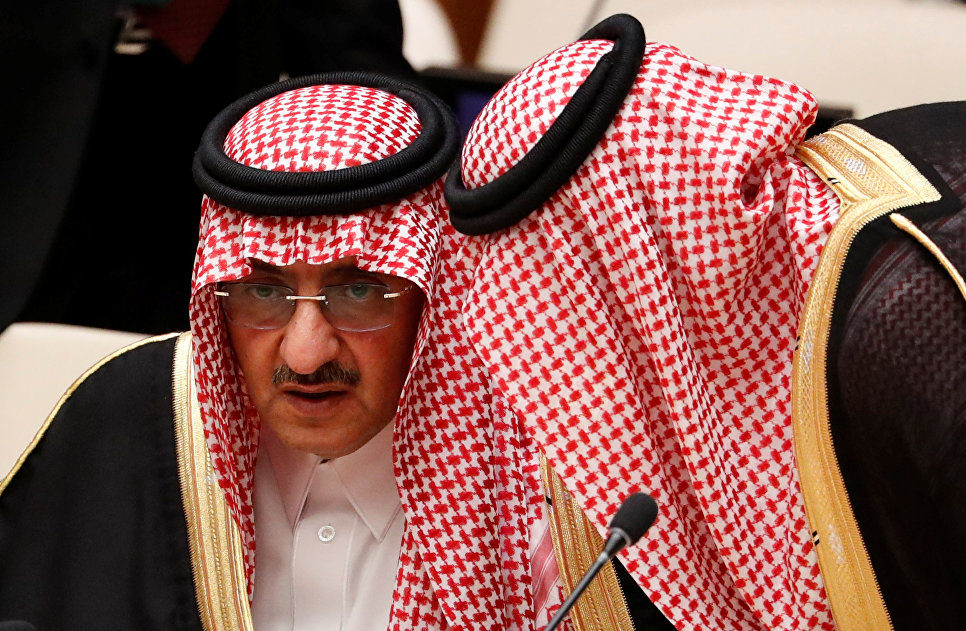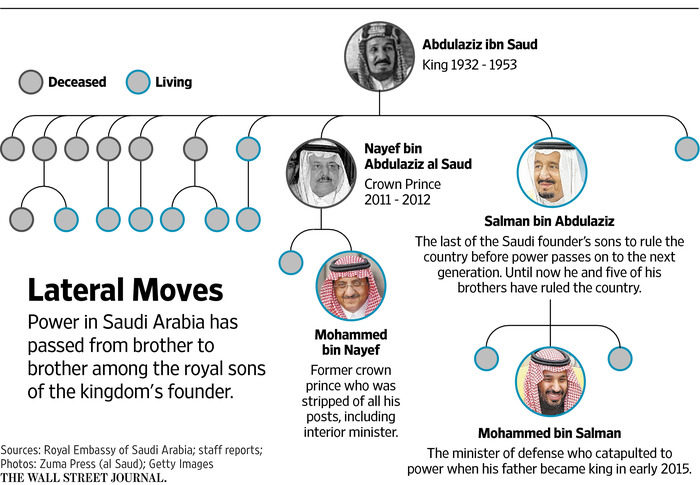
King Salman upended Saudi Arabia's succession order last month by naming his 31-year-old son, Mohammed bin Salman, crown prince and next in line to the throne, and sidelining his nephew and heir apparent, Mohammed bin Nayef, who has deep ties to U.S. intelligence and is widely viewed by U.S. officials as a stabilizing force in the region.
The newly elevated crown prince has limited the movements of Mohammed bin Nayef, the officials said. He has also replaced Mohammed bin Nayef's guards with ones loyal to the royal court, they said, in a bid to ensure that Mohammed bin Nayef doesn't take any steps to rally support.
"They want to make sure nothing is being plotted," one of these people said.
Referring to Mohammed bin Nayef, a representative of the Saudi royal court said in a text message that there were "no restrictions on his movement whatsoever, either in or outside of Saudi Arabia." The prince has hosted guests since the leadership change, the representative wrote in an emailed statement.
U.S. and Saudi officials said the royal court's efforts to stifle dissent within the kingdom include monitoring and in some cases infiltrating the social media accounts of some activists and bloggers.
Some activists and religious figures viewed as stirring protest on social media have also been summoned in person to meet with interior ministry officials, and at least one of those people was told by officials to quiet down or face jail time, according to people familiar with the matter.
The royal court official didn't respond to questions about the broader attempt to stifle dissent that the people familiar with the situation described.
Political parties are banned in Saudi Arabia as are protests, unions are illegal, the press is controlled and criticism of the royal family can lead to prison. Since the 2011 Arab Spring, the kingdom has stepped up efforts to curb dissent with tough laws, sentencing offenders to prison terms for Web posts deemed insulting to rulers or threatening to public order.
The recent crackdown follows the royal power shuffle and a move earlier in June by the kingdom to lead an economic blockade of neighboring Qatar, and is raising concerns among U.S. officials and observers that more political upheaval may be on the way, since the aging King Salman consolidated power in the hands of Mohammed bin Salman.
The Qatar blockade was championed by Mohammed bin Salman, while Mohammed bin Nayef favored a more tempered approach through diplomatic channels. That difference of opinions contributed to the timing of the power shuffle, The Wall Street Journal has reported.
The elevation of a new crown prince who backs a newly aggressive foreign-policy approach has concerned career U.S. officials who have long looked to Saudi Arabia as a source of stability in the Middle East.
Comment: "Source of stability" = covert source of instability via terror financing. Salman is just openly evil.
Mohammed bin Nayef was a trusted contact for those officials. U.S. President Donald Trump has appeared to embrace Mohammed bin Salman by meeting with him in both Riyadh and Washington, D.C., before his elevation to the crown prince role.
The White House didn't respond to requests for comment.
Mohammed bin Nayef "and his U.S. counterparts tended to see eye to eye on things," said Steven Simon, who worked on Middle East security issues as a senior director at the National Security Council during the Clinton and Obama administrations.
One former diplomat said of the sidelined prince that in Saudi Arabia and the U.S., "the whole security apparatus has been dependent on him."
Complaints about the escalating clash with Qatar led Saudi officials to boost efforts to monitor dissident communications and halt public criticism last month, in the weeks leading up to the power shuffle. Officials working for Mohammed bin Salman used technology from Hacking Team, an Italian company that provides surveillance tools to governments, according to people familiar with the matter.
Hacking Team didn't return a call and emails seeking comment.
Some critics have left social media. Cleric Bader al-Amer told his followers on June 14 that he will stop posting on Twitter and other social media indefinitely. His announcement came after he tweeted that several clerics and intellectuals believe Qatar's claim that it doesn't sponsor terrorism.
Ibrahim al-Modaimegh, a former legal adviser to the government, said on June 27 that he was leaving Twitter temporarily for health reasons and hoped the new Saudi leadership would free people imprisoned for their political views.
A key official in the effort to quell social-media protest, according to activists and journalists, is an employee of the new crown prince named Saud al Qahtani. Mr. Qahtani, an adviser to the royal court who gained the title of minister in 2015, launched a vocal Twitter campaign against Qatar at the time of the June 4 blockade, accusing Qatar of having plotted years ago to kill the late King Abdullah. Mr. Qahtani couldn't be reached for comment.
Officials at the kingdom's ministry of the interior have also been directly involved in the effort to suppress dissenting voices. A few weeks ago, they began summoning journalists, activists, preachers and others who were viewed as being publicly critical to meetings in which they were told to stop expressing these views, according to people familiar with these meetings.
The crackdown continued as the end of Ramadan approached, and then, on June 21, the leadership shift promoting his young son and sidelining his nephew.
The shuffle followed a series of moves that built up the power base of the younger Mohammed bin Salman, who is leading a plan to overhaul the economy that includes selling shares in the state-owned oil company on a public exchange in 2018.




Reader Comments
to our Newsletter